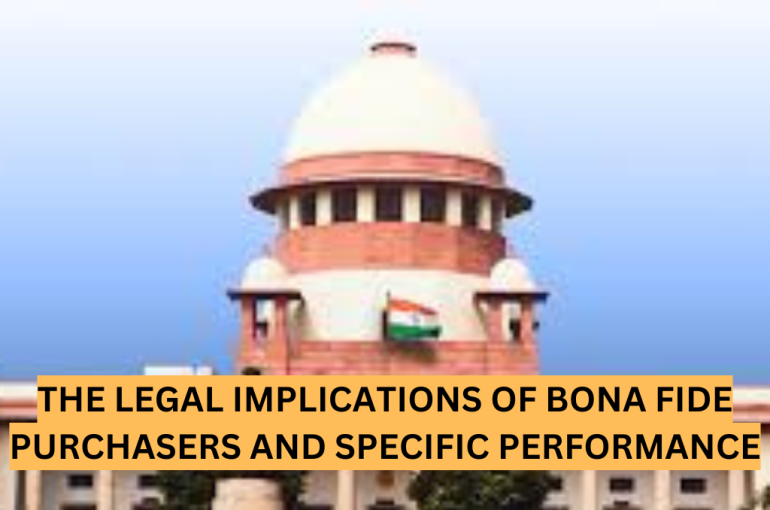THE LEGAL IMPLICATIONS OF BONA FIDE PURCHASERS AND SPECIFIC PERFORMANCE
This Judgment was delivered by a Division Bench of the Supreme Court comprising Hon’ble Justice J.B. Pardiwala and Justice R. Mahadevan on November 21, 2024, in the Supreme Court of India. It arose out of Civil Appeal No. 13066/2024, arising from SLP (C) No. 18899/2019, in the case of Manjit Singh & Anr. vs. Darshana Devi & Ors. The Case involves the Appellants, Manjit Singh & Anr., and the Respondentss, Darshana Devi & Ors. The main issue is whether the subsequent purchasers (Defendants Nos. 2 and 3) were bona fide purchasers for value without notice, as per Section 19(b) of the Specific Relief Act, 1963.
FACTS
In this Case, Respondents No. 1 (Plaintiff) filed a suit for specific performance based on an unregistered sale deed dated February 12, 1986, concerning the Suit Property. Defendant No. 1, the original owner of the Suit Property, had allegedly entered into an agreement with the Plaintiff. However, on August 29, 1986, the original owner sold the property to Defendants Nos. 2 and 3 (the Appellants) through a registered sale deed. The Plaintiff initiated Civil Suit No. 27/1987, requesting the enforcement of an alleged oral sale agreement. The Trial Court decreed in the Plaintiff’s favor, ordering specific performance. However, the decision of the Trial Court was challenged in the District Court (Court of First Appeal) by the subsequent purchasers (Defendants Nos. 2 and 3). The District Court allowed the appeal by the subsequent purchasers, quashing the decree of the Trial Court.
ISSUES
- Whether Defendants Nos. 2 and 3 qualify as bona fide purchasers for value without notice under Section 19(b) of the Specific Relief Act, 1963?
- Whether specific performance of the oral agreement of 1986 could be decreed in favor of the Plaintiff?
HIGH COURT
In this case, the High Court framed a substantial question of law regarding whether the First Appellate Court misread or failed to consider evidence while declaring the Defendants as bona fide purchasers under Section 19(b) of the Specific Relief Act and held that the subsequent purchasers were not bona fide purchasers for the following reasons:
- Defendant No. 2 (Manjit Singh) admitted that the original owner (Defendant No. 1) was his uncle and a co-sharer in the Suit Property.
- Defendants Nos. 2 and 3 did not inquire about the Plaintiff’s husband (who was the mortgagee in possession of the Suit Property).
- Payments for the sale deed were also questionable, as the Defendants had no proof of amounts withdrawn from banks or other legitimate sources.
CONTENTIONS BY BOTH PARTIES
PLAINTIFF CONTENTIONS (RESPONDENTS NO. 1):
The Plaintiff contended that the entitlement to specific performance was based on the oral agreement of 1986 between the Plaintiff and the Defendant. The Plaintiff also alleged that Defendants Nos. 2 and 3 were not bona fide purchasers as they failed to make inquiries regarding possession or encumbrances.
DEFENDANTS CONTENTIONS (APPELLANTS):
The Defendants argued that they were bona fide purchasers for value without notice of the Plaintiff’s claims. They also contended that they relied on the original owner’s title and fulfilled all legal formalities for the sale.
SUPREME COURT
The Apex Court ruled that the Appellants (subsequent purchasers) did not succeed in establishing that they acted in good faith and were bona fide purchasers under Section 19(b) of the Specific Relief Act. The Court mentioned that good faith requires due care, attention, and absence of negligence. The Appellants’ failure to inquire about the mortgagee’s possession and provide evidence of payment undermined their claims of good faith. The Court also referenced legal precedents, including R.K. Mohammed Ubaidullah v. Hajee C. Abdul Wahab, and highlighted that the burden of proof lies on subsequent purchasers to establish their bona fide status. According to the Apex Court, constructive notice under Section 3 of the Transfer of Property Act implies that possession of a property is deemed notice of the possessor’s rights. Hence, the Supreme Court upheld the High Court’s judgment, affirming that Defendants Nos. 2 and 3 were not bona fide purchasers, and the specific performance of the agreement was granted to the Plaintiff.
CONCLUSION
The Supreme Court reaffirmed that good faith under Section 19(b) of the Specific Relief Act requires diligence and honesty, and the Appellants failed to meet these criteria. Hence, the Court decreed the specific performance of the oral agreement in favor of the Plaintiff.
BADDAM PARICHAYA REDDY
ASSOCIATE
THE INDIAN LAWYER AND ALLIED SERVICES





































Leave a Reply